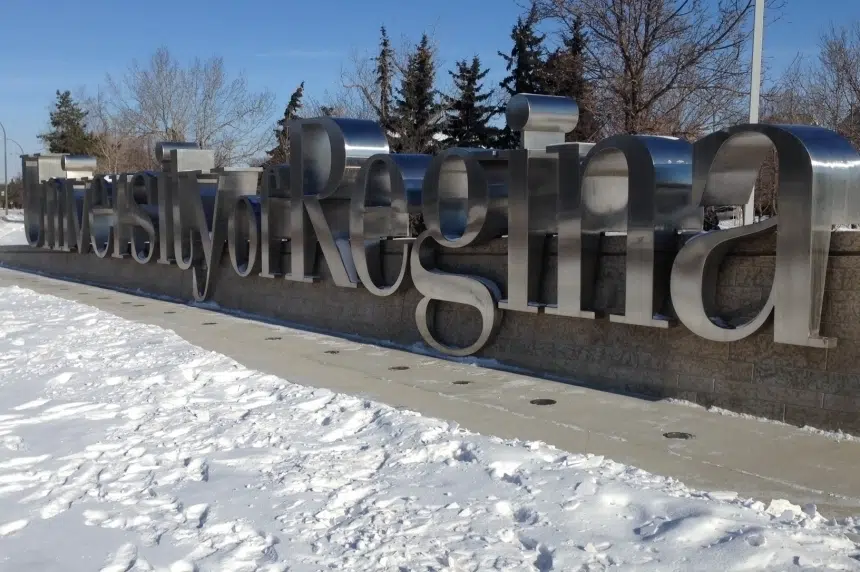Often university budgets can be inside-baseball, with the province and schools going back and forth negotiating over money – but now the lack of money given to the University of Regina could begin affecting students, in some cases forcing them to drag out finishing their degrees.
In the province’s current budget there was virtually no change in the operating grant given to either the University of Regina or the University of Saskatchewan.
In the University of Regina’s operating forecast for the current fiscal year, written in 2015, the university said if it doesn’t get at least a 4.4 per cent increase in the operating grant it will have to make cuts, which could mean eliminating staff, including faculty positions. The forecast warned that fewer staff could mean a reduction in how often classes are offered, making it more difficult for some students to finish their degrees.
This is a problem some students are already having to battle with at the university.
Natasha Zeiler is heading into her third year of a geology degree – a year in which there are four required geology classes she needs to take with labs.
“The teachers kind of came and talked to us this past semester saying, ‘hey there’s these four classes you have to take, they’re only offered in the fall, that’s just how it is.’ They didn’t really give us any explanation as to why, or any other options we could do.”
Because of her schedule, working part-time, and the large work load she’s decided to only take three of the classes. Zeiler needs all these classes to continue in her degree, but will have to wait until next fall to be able to take the fourth one.
This is also a concern when it comes to her required field school which only runs once a year, and which she couldn’t get into this year.
Because of these problems, at least one more year will be added on to the time it’s going to take Zeiler to finish her degree.
“It really just depends on what you get into and that sort of thing which can be frustrating,” said Zeiler
This situation isn’t unique to her – she has friends in the same program who may have to spend even longer trying to navigate class offerings because of prerequisites for sparsely offered required courses.
This is also a problem in other programs like the actuarial science, and biology faculties. However, in the actuarial sciences faculty the university has been known to allow students to take another class in place of a required one to allow students to graduate on time.
In the forecast for the current year, the university wrote it has suspended or terminated almost all the low-demand programs it’s been able to.
“The alternative is to drop courses from the University’s offerings and offer others less frequently, e.g., every second or third year. Having already been reduced in recent years, the number of sessional appointments would be cut even more, diminishing course offerings in many areas. As a result, students will find it more difficult to get the courses they need to complete their degree programs in a timely manner. “
The forecast for the 2017-2018 year included a similar warning: that no increase in the provincial grant over the next three years would require a reduction of approximately 37 full-time academic staff positions to help balance the budgets – though it didn’t specifically identify a reduction in class offerings as a risk.
Kim McKechney, Executive Director of Communications and Marketing with the university, said the university is not concerned about course offerings.
“People generally speaking, have more to choose from than in previous years, not less … On a whole we continue to increase our course offerings, particularly our online course offerings have increased exponentially over the last few years.”
He said the university has been facing a challenging fiscal environment – the provincial grant accounted for 60 per cent of total revenue six years ago, and is just over 53 per cent now.
He explained the university is also facing increased costs – with an expectation to provide more mental health services, aging infrastructure, the weak Canadian dollar affecting library acquisitions, and the need to offer competitive benefits and salaries for staff.
McKechney said the situations outlined in the forecasts prepared for the Ministry of Advanced Education put forth a worst-case scenario.
“We sometimes have to outline the worst so that we can avoid it.”
McKechney admitted the University of Regina is a big school and there may be times when people can’t get the courses they need.
He said the university has been able to deal with fiscal challenges in the past, and will continue to going forward.
“We continue to be confident that we’re going to be able to provide excellent teaching and research services in the future,” said McKechney.
Shawn Wiskar is the vice-president of student affairs at the University of Regina’s Students’ Union. He said the university needs to do a better job of being fiscally responsible and putting students before staff, but he also pointed to the province.
“We need to see more funding moved from the government towards universities in Saskatchewan. The Saskatchewan government really needs to put a focus on students because we are the future of the province.”
Wiskar said he’s heard of similar problems out of the liberal arts faculties like English and Human Justice, that the number of classes required for the degree need to be cut back because there’s not enough resources to hire profs for them.











